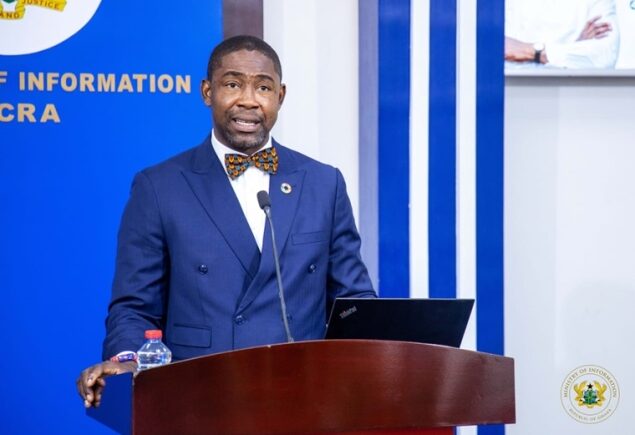The Ministry of Health is set to introduce key herbal medicines into the National Health Insurance Scheme (NHIS) to complement traditional pharmaceutical administration in order to provide choice to patients.
Once operational, the government will cover all costs associated with medical treatment and herbal medicines.
The system will also incorporate mental health and related drug treatment.
The Minister of Health, Bernard Okoye Boye, who announced this in Accra on Wednesday, [Sept 18, 2024]Speaking during the Ministry of Information’s “Meet the Press” series, he said not all herbal medicines were dangerous as some had undergone a scientific process and were approved for use.
Almost every health facility now has a unit dedicated to herbal medicines for the treatment of specific illnesses.
Touching on a wide range of issues, the Minister said that already all kidney patients below 18 years and above 60 years are being treated free of cost.
And those in between those two age groups will have dialysis treatments twice a month.
nurse
On the situation of nurses, Dr Okoye Boye said based on market labour analysis, the country was producing more nurses than required.
He said on an average, over 55,000 nurses leave the country every year and the surplus are sent abroad under Memorandum of Understanding (MoU).
The minister said the third batch of Ghanaian nurses was expected to depart for Barbados by the end of October this year, adding that similar agreements were being concluded between Ghana and Seychelles, Jamaica, Germany and the United Kingdom.
He said in line with these arrangements, the ministry is working to revise the curricula of nursing programs in the country to reflect national demand.
Currently, Ghanaian nurses travelling abroad are required to undergo a one-year or six-month intensive course to ensure they are compliant with the system.
Dr Okoye Boye also said the government would review the arrangement to ensure that a percentage of nurses’ salaries was paid directly into government coffers for the training of other nurses.
While acknowledging that remittances from nurses would help the economy, he said they would also help shore up the country’s foreign exchange reserves, adding: “Under the new arrangement, we must move at the same speed as the rest of the world.”
Job creation
The minister further said that since 2017, a total of 21,000 health workers are now on the government’s payroll.
He said about 3,000 health workers are hired each year and are either included on the government payroll or paid from funds raised by health facilities across the country.
The Minister said the Agenda 111 hospital project, currently being completed in various stages, would provide employment to about 60,000 health workers once completed.
Dr. Okoye Boye also presented photographic evidence of completed projects initiated by the previous administration across the country.
These include Fomena and Kumau hospitals, which he said were about 35 percent complete at the time of taking over.
Other hospitals including Tetteh Kwasie Hospital, Atibiye Hospital, Aburi Hospital and Kyebi Hospital were also refurbished.
He said the second phase of Bolgatanga Government Hospital had also been completed at a cost of $20 million from the Saudi Fund.
Also underway is the rehabilitation of La General Hospital in Accra, which the minister said is expected to be completed in 36 months.
Others include Suame Hospital in the Ashanti Region and the new Urology Centre at Korle-Bu Teaching Hospital in Accra.
Disclaimer: The views, comments, opinions, contributions and statements made by readers and contributors on this platform do not necessarily reflect the views or policies of Multimedia Group Limited.

